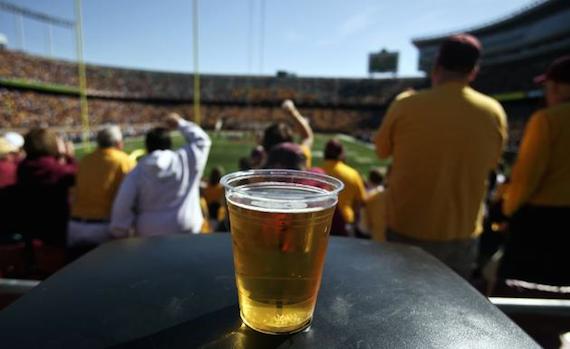Football and beer are a match made in testosterone heaven, but if you’re a fan of college football, there’s a chance you’ve never been able to drink in your favorite stadium. The sale of alcohol is one of the few things the NCAA does not regulate, but with the decision left up to the individual schools, many opt not to sell alcohol during their games. Why? They’ve all got different reasons: crowd control, religious affiliations, or not wanting to be associated with making a profit off of alcohol. Yeah, yeah, we get it… but luckily, a few schools are starting to change their minds in a hopefully positive move toward beer at all college football stadiums.
Some schools in bigger cities have been selling beer for many years in their sporting venues. Other schools, like West Virginia University, just recently added the sale of beer and so far, have seen favorable results. In an article by Dan Wolken in USA TODAY, he said that since implementing beer sales in 2011, WVU has generated about $500,000 in new revenue while also encountering a smaller amount of rowdy fan behavior related to binge-drinking outside of the stadium.
Starting this September, visitors to Southern Methodist University’s Ford Stadium will finally be able to buy wine and beer during football games. They did a trial run during basketball season and could not ignore the positive results. Their athletic department saw a six-figure profit over the course of only 12 games and they also said they haven’t had any alcohol-related arrests and there have been no spikes in behavioral issues. There were, of course, certain rules in place; it definitely wasn’t a free-for-all when it came to the alcohol sales. Students who are 21+ get a wristband with three pull tabs, with one being pulled off every time they buy a beer. Non-students get one alcoholic beverage per ID, per trip to the concession stand.
Wolken also talked to Virginia Tech’s athletics director Whit Babcock about his opinion regarding the sale of alcohol at football games. “It seems like it’s going that way, and I think you’ll see more doing it,” said Babcock. “But it’s a cultural issue at a place of higher education where there’s a tradition (of not selling it). I don’t know that it will be one of the top things on my agenda. But as more people do it… I’ll definitely be watching.”
So will we, Whit. So will we.


